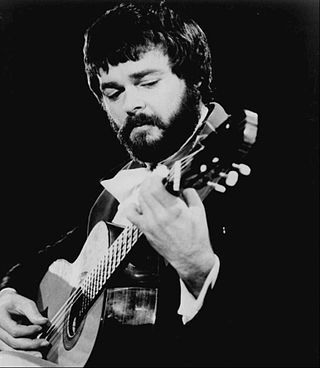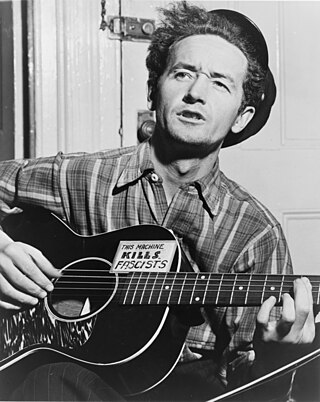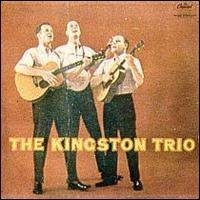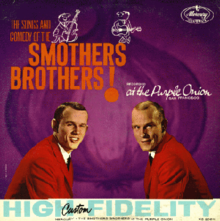
The Smothers Brothers were a duo of American folk singers, musicians, and comedians consisting of siblings Tom and Dick Smothers. The brothers' trademark double act was performing folk songs, which usually led to arguments between them. Tommy's signature line was "Mom always liked you best!" Tommy acted "slow" and Dick, the straight man, acted "superior".

Thomas Bolyn Smothers III was an American comedian, actor, composer, and musician, widely known as half of the musical comedy duo the Smothers Brothers, alongside his younger brother Dick. In the 1960s they were known for their network comedy and variety shows, The Smothers Brothers Show and The Smothers Brothers Comedy Hour.
The Weavers were an American folk music quartet based in the Greenwich Village area of New York City originally consisting of Lee Hays, Pete Seeger, Ronnie Gilbert, and Fred Hellerman. Founded in 1948, the group sang traditional folk songs from around the world, as well as blues, gospel music, children's songs, labor songs, and American ballads. The group sold millions of records at the height of their popularity, including the first folk song to reach No. 1 on popular music charts, their recording of Lead Belly's "Goodnight, Irene." Despite their popularity, the Weavers were blacklisted during much of the 1950s.

The Kingston Trio is an American folk and pop music group that helped launch the folk revival of the late 1950s to the late 1960s. The group started as a San Francisco Bay Area nightclub act with an original lineup of Dave Guard, Bob Shane, and Nick Reynolds. It rose to international popularity fueled by unprecedented sales of LP records and helped alter the direction of popular music in the U.S.

Golden Hits of the Smothers Brothers, Vol. 2 is the Smothers Brothers' first greatest hits album. There is no Volume 1, but all of the routines had been performed on earlier comedy albums by the duo. These are not the same performances contained on other albums, making it a "new" album. There was not a true hits collection for the duo until Sibling Revelry: The Best of the Smothers Brothers released in 1988.
"Tom Dooley" is a traditional North Carolina folk song based on the 1866 murder of a woman named Laura Foster in Wilkes County, North Carolina by Tom Dula. One of the more famous murder ballads, a popular hit version recorded in 1958 by The Kingston Trio reached No. 1 on the Billboard Hot 100 singles chart, was in the top 10 on the Billboard R&B chart, and appeared in the Cashbox Country Music Top 20.

Mason Douglas Williams is an American classical guitarist, composer, singer, writer, comedian, and poet, best known for his 1968 instrumental "Classical Gas" and for his work as a comedy writer on The Smothers Brothers Comedy Hour, The Glen Campbell Goodtime Hour, and Saturday Night Live.

The Smothers Brothers Play It Straight is the ninth album by the Smothers Brothers. As the title indicates, the folk comedy duo were singing the songs "straight". Like the B-side of their second album, Two Sides of the Smothers Brothers, the recording was done in a studio instead of on stage. The album cover shows Tom standing with his guitar and Dick sitting on a stool with his bass lying behind him. There is also a chicken eating chicken-feed, which could be a representation of Frank, Tom's wagon pulling chicken who is discussed on Mom Always Liked You Best!.

The Two Sides of the Smothers Brothers is the second comedy album by the Smothers Brothers. Side 1 consisted of comedy and was recorded at The Crystal Palace in St. Louis during a live performance. Side 2 was recorded at the Bell Sound Studios in New York City with a full orchestra and represented the singing side of the boys. The Two Sides of the Smothers Brothers reached number 26 on the Billboard Pop Albums chart.

"Curb Your Tongue, Knave!" is the fourth comedy album recorded by the Smothers Brothers, released November 1, 1963 on Mercury Records. The album was recorded live at Mister Kelly's in Chicago, Illinois. It reached number 13 on the Billboard Pop Albums chart. Curb Your Tongue, Knave! was the first of their original albums to be reissued on CD.

"It Must Have Been Something I Said!" is the fifth comedy album from the Smothers Brothers. It reached number 23 on the Billboard Pop Albums chart. The single "Jenny Brown" had peaked at #84 on the 1963 Pop Singles chart, however the recording here is a different, "live" version. The album was recorded at The Ice House in Pasadena, California. The cover photograph showed Dick having just smashed a guitar over Tom's head, thereby justifying the album title as a word balloon.

Tour de Farce: American History and Other Unrelated Subjects is the sixth comedy album by the Smothers Brothers. It reached number 58 on the Billboard Pop Albums chart. Recorded at The Ice House, Pasadena, California. The back of the album contains the note: "For special enjoyment, try playing your old Smothers Brothers albums at 45 rpm."

"Mom Always Liked You Best!" is the eighth comedy album by the Smothers Brothers. It reached number 39 on the Billboard Pop Albums chart. The album was recorded at The Troubadour, Los Angeles, California, The Golden Bear, Huntington Beach, California, and the Flamingo Hotel, Las Vegas, Nevada.

Sibling Revelry: The Best of the Smothers Brothers is a compilation album released by Rhino Records in 1988. A 1998 CD re-issue added "Cabbage", "Michael Row Your Boat Ashore" and "You Didn't Come In"/"Tommy's Song" as bonus tracks. The album contains at least one track from each of their previous albums with the exception of The Smothers Brothers Play It Straight.

Smothers Brothers Comedy Hour is a 1968 comedy album released on Mercury Records by the Smothers Brothers consisting of bits from their CBS television series, The Smothers Brothers Comedy Hour. As a result, much of the album consists of political humor, which was absent from their previous recording efforts but remained true to their television show's content. It reached number 164 on the Billboard Pop Albums chart.
"Tzena, Tzena, Tzena", sometimes "Tzena, Tzena", is a song, written in 1941 in Hebrew. Its music is by Issachar Miron, a Polish emigrant in what was then the British Mandate of Palestine, and the lyrics are by Yechiel Chagiz.

The American folk music revival began during the 1940s and peaked in popularity in the mid-1960s. Its roots went earlier, and performers like Josh White, Burl Ives, Woody Guthrie, Lead Belly, Big Bill Broonzy, Richard Dyer-Bennet, Oscar Brand, Jean Ritchie, John Jacob Niles, Susan Reed, Paul Robeson, Bessie Smith, Ma Rainey and Cisco Houston had enjoyed a limited general popularity in the 1930s and 1940s. The revival brought forward styles of American folk music that had in earlier times contributed to the development of country and western, blues, jazz, and rock and roll music.

"Green Onions" is an instrumental composition recorded in 1962 by Booker T. & the M.G.'s. Described as "one of the most popular instrumental rock and soul songs ever" and as one of "the most popular R&B instrumentals of its era", the tune is a twelve-bar blues with a rippling Hammond M3 organ line by Booker T. Jones that he wrote when he was 17, although the actual recording was largely improvised in the studio.

The Kingston Trio is the Kingston Trio's debut album, released in 1958. It entered the album charts in late October 1958, where it resided for nearly four years, spending one week at #1 in early 1959. It was awarded an RIAA gold album on January 19, 1961.
The Purple Onion was a celebrated cellar club in the North Beach area of San Francisco, California, located at 140 Columbus Avenue. With an intimate, 80-person setting, the club was a popular influence in local music and entertainment during the Beat era of the 1950s and 1960s.














